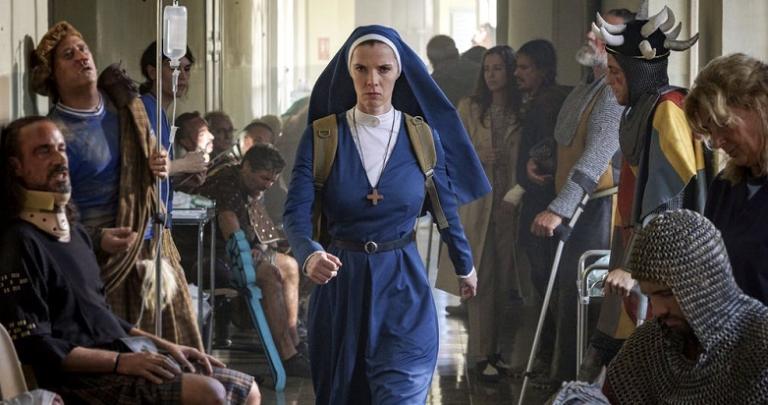
Mrs. Davis, the first four episodes of which have dropped on Peacock, is what you get when you toss Monty Python and the Holy Grail, The Hitchhiker’s Guide to the Galaxy, Father Ted, The Good Place and Silicon Valley into a blender and hit purée.
But is it good?
As they say on social media, it’s complicated.
What’s Mrs. Davis About?
Simply put, it’s about an all-powerful AI, nicknamed Mrs. Davis in the U.S., that sends a nun named Sister Simone (Betty Gilpin) — who harbors a major grudge against Mrs. Davis and refuses to use the app — on a quest to find and destroy the Holy Grail.
As goofy as that sentence sounds, it makes more sense than most of what you encounter along the way.
Over eight episodes, Mrs. Davis hops from the Southwest to Scotland to Rome, encountering the nun’s cowboy ex-boyfriend (Jake McDorman) and magician parents (David Arquette, Elizabeth Marvel), a well-financed underground resistance run by a high-testosterone guy (Chris Diamantopolous) who’s averse to shirts, the pope, a secret society of pantsuit-wearing women, and a diner cook who’s not just a guy slinging hash (or, in this case, falafels).
To say Mrs. Davis is loopy is like saying the Sistine Chapel has a pretty ceiling.
There are funny bits and dramatic bits and even some heart-tugging bits, but mostly I just sat there going, “Huh?”
But Is Mrs. Davis Good?
Executive-produced and written by showrunner Tara Hernandez (The Big Bang Theory, Young Sheldon) and Damon Lindelof (Lost, Watchmen, The Leftovers), it’s well-produced and acted, relentlessly imaginative and, despite the general nuttiness of the plot, heads somewhere and actually arrives there.
That’s more than I can say for Lindelof’s other shows, which tend to be muddled puzzle-boxes that ultimately don’t quite pay off the questions they pose.
Mrs. Davis does, but Catholics probably won’t like a lot of the answers. But they might like some of them.
The show’s theology is wack, but its heart, especially considering the perils of technology, is in the right place.
According to McDorman, at least one other streamer (my guess is Netflix, but I could be wrong) turned down the show because it showed algorithms in a “negative light” — which it does.
There are profanities sprinkled throughout the script, but there’s no nudity or actual sex scenes, and the violence is more cartoonish than graphic.
But Is Mrs. Davis Anti-Catholic?
I wouldn’t say that. And I wouldn’t say it’s anti-religion either, casting a much more skeptical eye on making technology into a god than on God Himself.
Simone is a nun because she fell in love with Jesus, though in a more literal sense of “Bride of Christ” than we understand it.
From TV Guide:
“When we landed on this idea that a nun was going to be our hero in the story, it was really important to both of us that that was something she embodied truly and deeply, and it wasn’t just a cool costume to see riding on a motorcycle,” Hernandez told TV Guide. “[In] our own relationships with, whether it’s faith or religion or the church, it felt like: What is the one thing we can grasp onto that we relate to as people? And that’s love, and love stories.”
But Sister Simone believes. Her fellow nuns also believe, and nothing about the show denigrates or makes fun of that.
The show’s idea of what and who Jesus is is unconventional, to put it mildly, but it’s not negative. It’s like the writers were willing to sidle up to the edge of the core truth of Christianity but veered off at the last moment.
Oh, the Virgin Mary shows up, too, and, well, I didn’t care for that. At. All.
Mrs. Davis winds up in the odd position of supporting the idea of faith in a non-technological higher power — specifically a Christian one — but being unwilling to support all the truths of that Faith.
What’s Up With Damon Lindelof and Faith?
Lindelof, who is Jewish, has flirted with faith before in his work. Fans of Lost know that it was woven here and there into that show, even causing people to speculate the crashed-airliner castaways were actually in Purgatory (the debate continued even after the finale).
And The Leftovers posited a Rapture-like sudden disappearance of 2% of the world’s population. I didn’t watch the show, but I’m given to understand it had all sorts of theological undertones.
A story in the U.K. Guardian made a valid point about Lindelof:
He respects the great quandaries of religion enough to take them seriously, though his interrogations of the sacred always include a few doses of sniggering profanity. This balance of skepticism and belief takes intriguing new form in Lindelof and co-creator Tara Hernandez’s new Peacock series Mrs. Davis, which constructs a metaphorically pliable deity in a distant cousin of Siri and Alexa.
Also, Lindelof seems to have a thing for action-oriented nuns. His HBO series The Watchmen was based on a comic. But, as I pointed out in an earlier story on The Watchmen, the nun character was a new addition.
What piqued my curiosity is the main character (created for the series), Tulsa undercover cop Angela Abar (Regina King), works in a costumed, masked persona she calls Sister Night (the whole Tulsa PD wears masks, including a giant panda head, for their personal safety. Yeah. Anyway …)
As Sister Night, Abar wears a pull-up mask, a long, hooded black leather coat, black leggings and boots, and a white turtleneck. A police star is attached to her wide belt, and a long Rosary with big wooden beads is also looped around it. In the pilot, she pulls off the rosary and apparently beats someone with it.
Eventually, the origin of Sister Night was explained, and honestly, it was dumb. Sister Simone doesn’t wear a Rosary, but her blue habit does feature a white mock-neck, a belt and a pretty nifty split skirt (good for riding horses and motorcycles).
It’s interesting to think how this show could have been different and, IMHO, better, if it bought into the truths of Christianity, rather than driving around them to reach a made-up dogma.
A lot of Hollywood would say, “Christianity is a made-up dogma, so what’s the difference?” And that’s the problem.
You can’t write with real passion about something you don’t think is real. So, sooner or later, you’re going to take a turn into something you do think is real, like sex or money or power.
It’s always ultimately unsatisfying, even if it feels good in the storytelling moment.
Should Catholics Watch Mrs. Davis?
Not if you want an accurate depiction of Catholicism. Honestly, you’ll get more of that in The Pope’s Exorcist, silly as it is.
But in our app-soaked world, Mrs. Davis has interesting questions to ask about our dependence on technology, the perils of instant gratification, and our need to seek meaning and guidance, whether from God or the Internet — and it doesn’t come down on the side of the Internet.
The final reveal of what Mrs. Davis is, and what it started out to be, is a kicker. Anyone who’s followed the rise of personal computing and the Internet will nod and go, “Yup, that totally could happen.”
Because, in the end, the Internet is man’s creation, reflecting the strengths and weaknesses of its maker — flawed, broken humans.
It ain’t God, and it never will be. For all its theological missteps, Mrs. Davis comes to the same conclusion.
UPDATE 5/18: In this interview, Lindelof and Hernandez discuss the origins of the algorithm as revealed in the finale (but not their rather peculiar notions of Jesus, etc.).
Each episode of Mrs. Davis streams on Peacock on Thursdays, starting back on April 20. That means the next episode debuts on April 27, 2023.
Image: Betty Gilpin as Sister Simone in ‘Mrs. Davis’ — (Photo by: Sophie Kohler/PEACOCK)
Don’t miss a thing: Subscribe to all that I write at Authory.com/KateOHare














